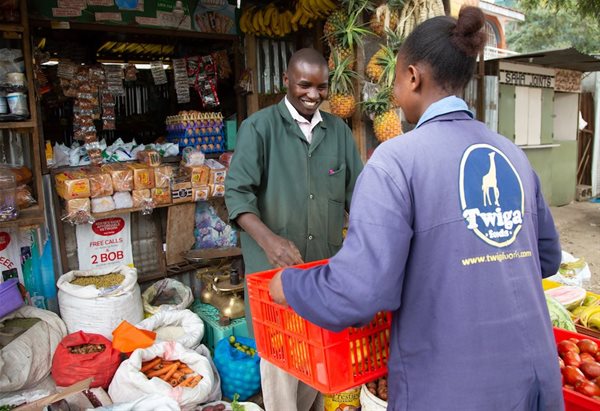Kenya's Twiga Foods raises $30m in Series B round

Since launching in Nairobi in 2014, Twiga has been building Kenya’s only end-to-end distribution for fresh and processed food, sourcing from more than 17,000 producers and delivering 3 times a week on average to over 8,000 retailers. Twiga’s digital platform and logistics network links retailers with farmers and food manufacturers, presenting a convenient and reliable alternative to the current inefficient and expensive farm/factory-to-market processes.
The Series B will fund the continued development of Twiga’s proprietary technology and logistics assets to support the roll-out of its distribution system and lay the foundations for expansion into other cities on the continent.
Tackling inefficiencies in production, distribution
Twiga operates a mobile-based, cashless platform to aggregate urban retail demand, offering thousands of small and medium-sized vendors convenient one-stop-shop ordering. Retailers have access to lower-cost, higher-quality fresh produce and processed food, conveniently delivered to their doorstep within 18 hours of ordering.
As a result, farmers and food manufacturers have guaranteed access to a fairly priced, transparent marketplace. Twiga pays farmers within 48 hours of collection with mobile money, providing them with increased income visibility and permitting better financial planning.
Twiga covers a range of fresh produce and a growing share of the overall shopping cart. Its fresh offering includes bananas, potatoes, onions, tomatoes and watermelons - popular staples in Kenya. More recently, leading Kenyan manufacturers have tapped into Twiga’s technology-led distribution network, with the company now distributing a fast-growing range of processed food including rice, maize flour, cooking oil, milk, juice, sugar and snacks.
Twiga is also tackling inefficiencies in the supply chain, helping to reduce food prices for consumers. Currently, between 30 and 50% of fresh produce is lost through poor post-harvest processes. Through investment in its supply chain and material handling, Twiga has reduced the level of food waste by up to 70% compared to the market averages.
Peter Njonjo, CEO and co-founder at Twiga Foods, says, “This funding enables us to invest in our technology and organisation to tackle the inefficiencies in Africa’s domestic food production and distribution ecosystems; a $300bn informal and fragmented market that is estimated to grow to $1trn by 2030. With the support of our investors, we are developing technology-driven commercial solutions and cooperating with existing industry players to solve the challenge of food security in Africa.”
Food security
Jules Frebault of Goldman Sachs said, “Twiga’s innovative model combines technology and modern logistics tailored to the local market to re-engineer the food supply chain. We are delighted to be backing Peter and the highly capable team as they scale operations and drive sustainable access to lower-cost quality food on the continent.”
With sub-Saharan Africa’s population set to double over the next 30 years, access to reliable and affordable food sources for consumers and guaranteed markets for farmers are essential for effective food distribution.
Prof. Hamadi Boga Principal Secretary of the Kenya State Department for Crop Development and Agricultural Research said, “Food security is a key priority for the Kenyan government and Twiga Foods is playing a major role in achieving this. As our population grows and urbanisation continues, it is essential that we can provide access to affordable food for as many Kenyans as possible, as well as support and promote sustainable agriculture. We commend them on their impact so far, as well as their ability to attract investment to Kenya.”

























